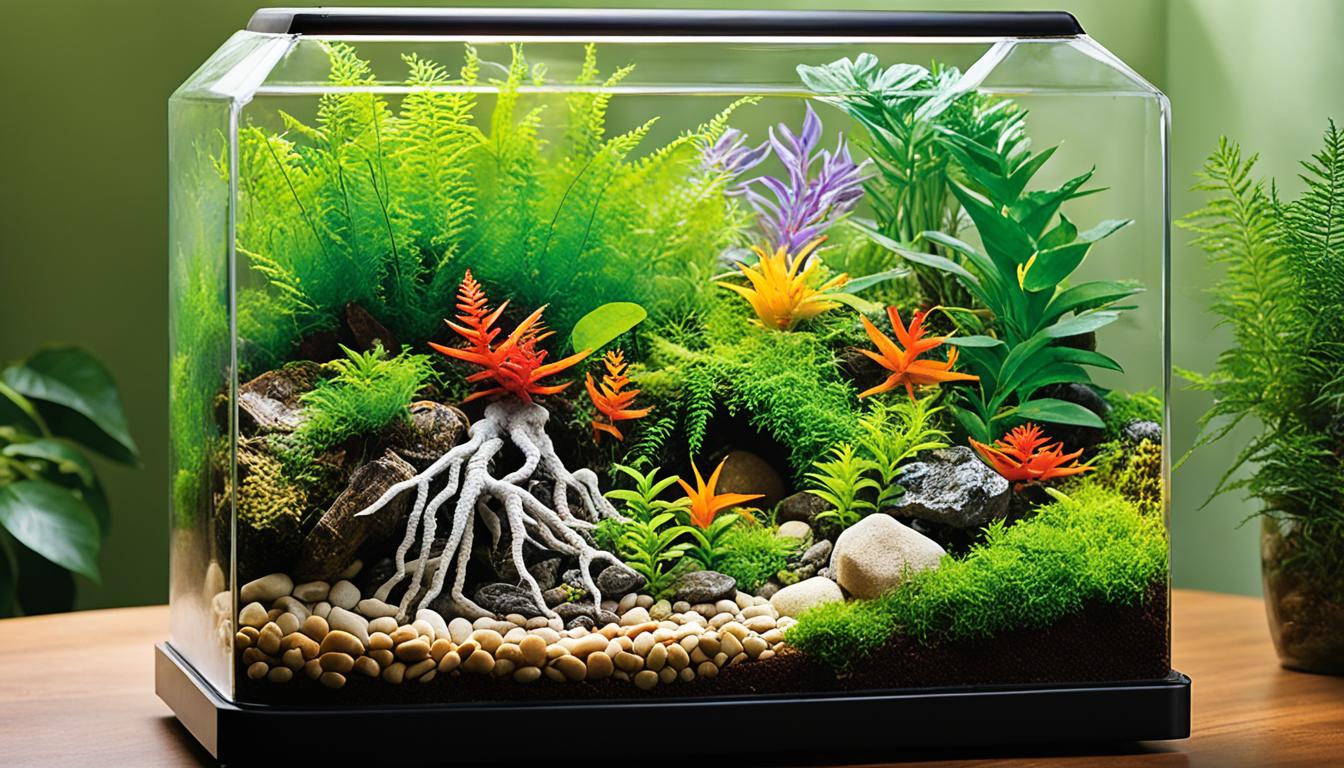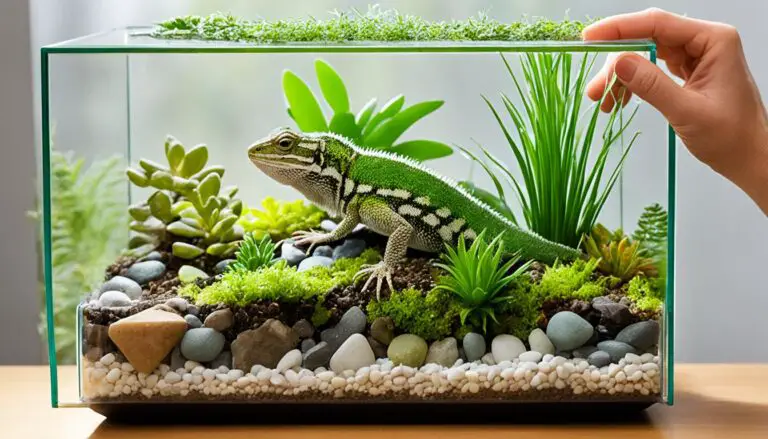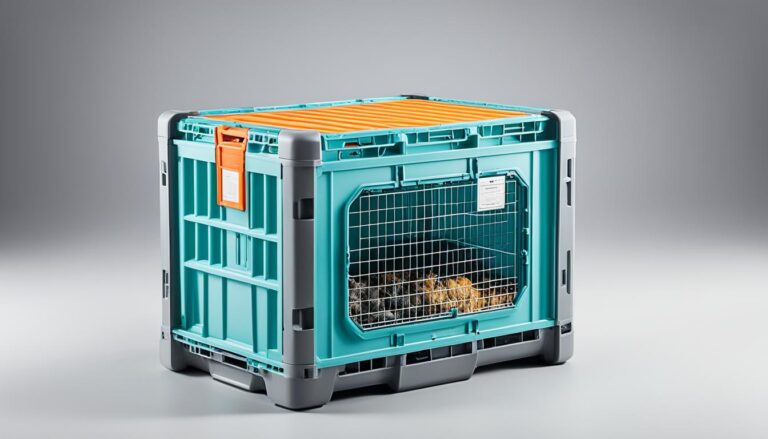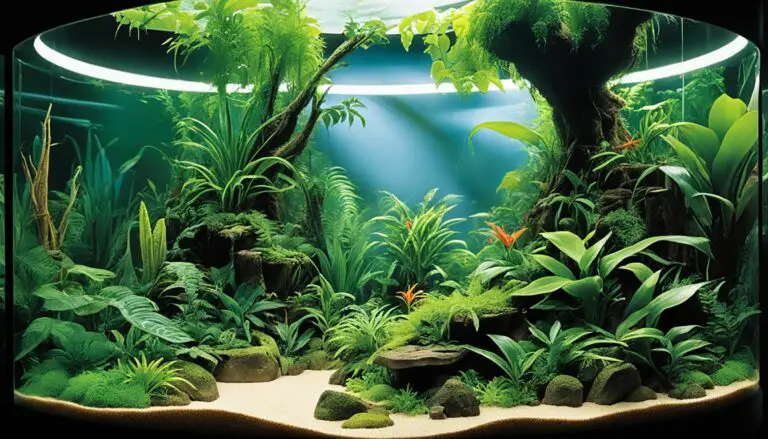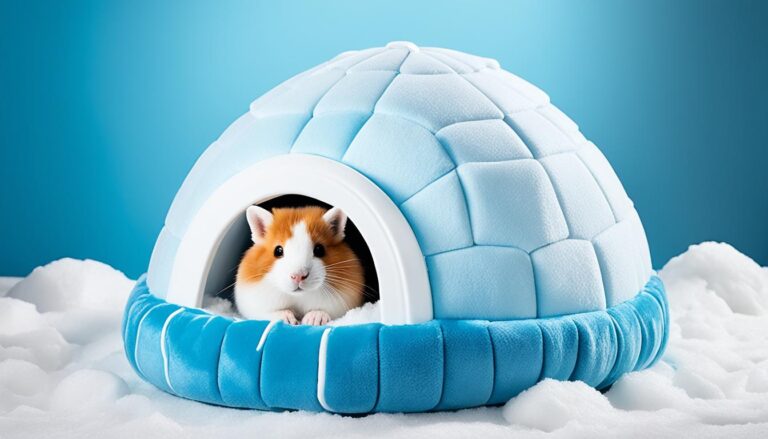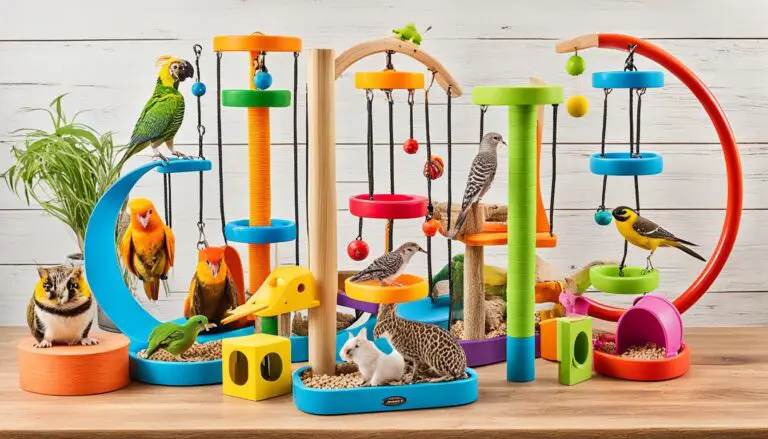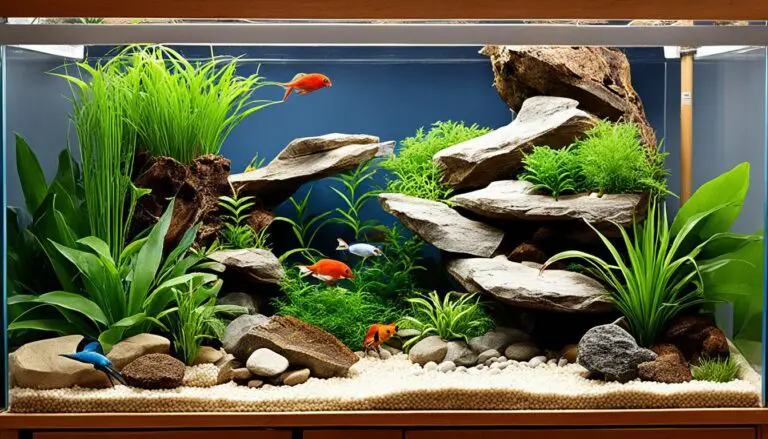Exotic Pet Housing for Invertebrates | Care Tips
Having an exotic invertebrate as a pet means you need to be very careful with their home. It’s important to make a habitat that feels like their natural world to keep them healthy and happy. Think about things like how warm or cold it should be, how wet or dry, what to put on the bottom, and how big the space needs to be.
Key Takeaways:
- Exotic invertebrates require a specialized habitat designed to replicate their natural environment.
- Research and understand the specific needs of your invertebrate pet species in terms of temperature, humidity, substrate, and enclosure size.
- Choose the right enclosure that provides the necessary size, ventilation, accessibility, and ease of maintenance for your invertebrate.
- Create an ideal environment by providing appropriate lighting, heat sources, and decorations that mimic their natural habitat.
- Monitor and maintain optimal temperature and humidity levels within the enclosure.
Understanding the Needs of Exotic Invertebrates
Researching before getting an exotic invertebrate pet is key. Knowing about exotic invertebrate habitats, best housing for invertebrate pets, and invertebrate terrarium setup is crucial. This ensures your pet’s well-being in captivity.
Exotic invertebrates hail from varied environments, like dense rainforests and dry deserts. To build a proper home, replicate their original habitat closely. Temperature, humidity, the type of ground, and living space size are all vital.
Temperature: These creatures prefer different temperatures based on their kind. Find out what temperature suits your pet best. Heat pads, lamps, or ceramic heaters can help. Use a thermometer to keep the temperature just right.
Humidity: The right humidity level is crucial for your pet’s health. While some need wet environments, others like it dry. Learn what your pet needs. Use misting, fogging, or humidifiers to maintain this.
Substrate: The ground in the enclosure has several roles. It supports burrowers, helps control moisture, and deals with waste. Your pet might need a specific ground type, such as soil or mulch. Choose wisely to avoid anything harmful.
Enclosure Size: A good home allows freedom for movement, hiding, and natural actions. Research the space your pet will need, thinking about its size and liveliness. Providing room for climbing or burrowing is important.
Remember, every exotic invertebrate is different. They each have special needs. Learning about and creating a space close to their natural home is key to their happiness.
Common Exotic Invertebrate Habitats
| Species | Preferred Habitat |
|---|---|
| Tarantulas | Terrestrial burrowing setups with a combination of soil and bark |
| Mantises | Tall mesh enclosures with branches for climbing and hanging |
| Scorpions | Desert-style enclosures with sand substrate and shelters for hiding |
| Millipedes | Moist terrariums with leaf litter, rotting wood, and hiding spots |
It’s critical to research your exotic invertebrate’s specific requirements. This way, you can give them the best home possible.
Choosing the Right Enclosure for Your Invertebrate
Different invertebrates need diverse enclosures. Think about size, ventilation, how easy it is to get into, and how simple it is to keep up. These factors help pick the best home for your pet.
Types of Invertebrate Enclosures
Many kinds of tanks exist for invertebrates:
- Glass Terrariums: These are great for pets needing stable conditions. You get clear views and can decorate them with items for climbing and greenery.
- Plastic or Acrylic Tanks: Light and tough, these work well for land and water invertebrates. They come in many sizes and are easy to clean.
- Specialized Enclosures: Certain pets might need unique homes due to their habits. This could mean special air flow, moisture, or ground cover.
Considerations for Choosing an Enclosure
Keep these points in mind when choosing:
- Size: The home must let your pet move, climb, and dig easily. Find out what space your species needs to live comfortably.
- Ventilation: Good air flow keeps the environment right. Seek homes with good air systems or think about adding more ventilation.
- Accessibility: Picking a home you can easily clean, feed, and care for is smart. Some have panels or doors that open, so you don’t bother the pet.
- Ease of Maintenance: Choose one that’s easy to clean. Homes with parts that come off or surfaces that wipe clean are best.
Tip: Learn about your pet’s specific needs before deciding. Use good sources and ask experts for advice.
Choosing carefully means a safe, cozy home for your pet. Always check the home’s conditions and fix problems to keep your pet happy and healthy.

Creating the Ideal Environment
Creating the right home for your invertebrate pet involves more than just a tank. It’s essential for their happiness and health. Focus on lighting, warmth, and air flow to make them happy.
Enhance their home with invertebrate tank decorations. This makes their space like their natural home and keeps them active. Consider these decorations for your pet’s home:
- Natural Substrates: Coconut fiber, leaf litter, or moss resemble their natural ground.
- Rocks and Branches: These provide places to climb and hide, making them feel secure.
- Hiding Spots: Caves or hideouts give them safety and comfort.
Decorating their tank improves how it looks and supports your pet’s health. Choose safe decorations that won’t hurt your pet.
Each invertebrate has unique needs. Learn what your pet’s species prefers for their home. This helps you pick the right decorations and design a natural-like habitat.
Use the right lights, warmth, and air flow along with the best decorations. This will create a great home for your pet. A good home reduces stress and lets your invertebrate thrive while in your care.
| Invertebrate Housing Options | Description |
|---|---|
| Natural Substrates | Coconut fiber, leaf litter, or moss that mimic the species’ natural habitat. |
| Rocks and Branches | Provides climbing structures and hiding spots for your invertebrate pet. |
| Hiding Spots | Small caves or hideouts that offer security and a sense of protection. |
Maintaining Optimal Temperature and Humidity
Keeping the right temperature and humidity is key for your invertebrate pets. Different species need different things. It’s important to keep an eye on these conditions. This way, we keep them healthy and happy.
Invertebrate Terrarium Setups: Every invertebrate species has its own needs. Some like it warm and moist, others cool and dry. Learn what your pet needs. Then, make their home as much like their natural habitat as possible.
Arachnid Housing Solutions: Arachnids, like spiders and scorpions, need special care. Tarantulas love warm, humid places. Scorpions like it a bit drier. Make sure their home has good air flow. This helps keep the right temperature and moisture.
A balanced combination of temperature and humidity control methods
There are ways to keep the perfect temperature and humidity for your invertebrates. Let’s look at some common methods:
- Heaters: Use a heater for pets that need warmth. Pick one made for terrariums or aquariums. Always follow the safe use instructions.
- Coolers: Some pets need cooler temperatures. A cooler can help. Just make sure there’s enough air flow. This stops mold from growing.
- Misting systems: If your pet likes humidity, try a misting system. Spraying water increases moisture. But, watch out for too much water.
- Hygrometers: To keep an eye on humidity, use hygrometers. They measure moisture. This lets you adjust the environment to keep it just right.
By using the right temperature and moisture controls, you create a great home for your pets.

Always check and change the environment inside their home to keep it perfect. Regular care makes for healthy, happy pets.
Feeding and Nutrition for Invertebrates
It’s crucial to feed your invertebrate pet properly. Start by learning what your species needs to eat. This ensures they get the right nutrients.
Different invertebrates eat differently. So, it’s vital to give them a variety of foods suited for their needs.
Many invertebrates eat meat and need live bugs for food. Crickets, mealworms, and fruit flies are great for them. Always buy these insects from trusted places to avoid parasites.
If your pet eats plants or both plants and meat, fruits and vegetables are good for them. For example, kale and spinach can be very healthy. Bananas, apples, and melons are also great choices.
Some pets might need special store-bought foods made just for them. These foods could be pellets or powders and are easy to use.
Always look up what your invertebrate likes to eat. A vet or someone with exotic pet experience can help too.
Invertebrate Feeding Tips
- Give your invertebrate small, suitable food pieces to avoid eating problems.
- Keep an eye on how much they eat and change it if needed. Some need to eat often, while others don’t.
- Take out any food they don’t eat to stop mold and bacteria.
- Use dishes for their food to keep their home clean and safe.
- Give them extra vitamins and minerals if they need them. A vet can tell you what’s best.
Good nutrition is key for your invertebrate pet’s health and happiness. Feeding them a varied and balanced diet helps them grow strong and stay healthy.
Handling and Care Techniques
To safely handle your exotic pet, think about its needs. Handling varies depending on the species. Here are guidelines to keep both you and your pet safe.
Educate Yourself on Proper Handling Techniques
Learn the right way to handle your exotic pet before trying. Look up reliable sources. Ask experts for advice. Knowing how to pick up your invertebrate reduces stress and risk of harm.
Be Gentle and Avoid Mishandling
Invertebrates are fragile, so be gentle when handling them. Move slowly and support their bodies well. Avoid quick moves that might scare or hurt them.
Supervise Children Around Invertebrates
Watch your kids when they’re near your exotic invertebrate. They might not know how delicate these pets are. Teach them to be careful. Always watch their interactions to keep both safe.
Recognize Signs of Stress or Discomfort
Look for any discomfort signs in your pet while handling. Signs include curling up or trying to get away. If stressed, gently put them back in their home to avoid more stress.
Each invertebrate species is different, with their own like or dislike for handling. Some might enjoy it, while others don’t want much human contact.
Consult an Expert for Specific Handling Advice
If unsure about how to handle your pet, ask an expert. Contact an exotic pet vet or a reputable pet store. They can offer guidance and answer your questions about safe handling.

| Handling Do’s | Handling Don’ts |
|---|---|
|
|
Maintaining Hygiene in the Invertebrate Enclosure
Keeping your exotic pets healthy means regular cleaning and maintenance. For invertebrate pets, it’s extra important to keep their home clean. This stops harmful bacteria and other bad stuff from hurting your pets.
To keep your invertebrate pet’s home clean and safe, follow these steps:
- Remove any soiled substrate: Their home often has a layer at the bottom that gets dirty with waste or uneaten food. Check this layer often and take out any dirty parts. Then, put in new, clean material to keep their home tidy.
- Clean feeding dishes and water bowls: Bowls for food and water can get dirty with bacteria. Wash them well with mild dish soap and warm water. Make sure to rinse all the soap off so it doesn’t harm your pets.
- Sanitize the enclosure: Clean the whole home of your pet with a safe disinfectant now and then. Make sure it’s a product safe for reptiles, and use it as the maker says. Stay away from strong chemicals that could hurt your pets.
Be careful with cleaning products and keep your pets away from any harsh chemicals. It’s smart to take your pets out while you clean their home. Let their home dry completely before putting your pets back in.
Hygiene is key for your invertebrate pets’ health. Cleaning well makes a happy and safe home for them. This lowers the chance of illness. By keeping their home clean, you’re making sure your exotic pets are happy and healthy.
| Benefits of maintaining hygiene in the invertebrate enclosure | Consequences of poor hygiene |
|---|---|
| Prevents the growth of harmful bacteria | Increased risk of infections |
| Reduces the likelihood of mold or fungus growth | Unpleasant odors |
| Maintains a clean and visually appealing habitat | Compromised pet health and well-being |
Caring for your invertebrate pet means keeping their home clean. Stick to good cleaning routines to make a safe and healthy place for your exotic pets. This is a big part of being a responsible pet owner.
Recognizing Signs of Illness in Invertebrates
Invertebrates are fascinating as pets and need special care. They can be hard to read compared to cats or dogs. They show illness in subtle ways and might hide their pain.
It’s key to keep a close eye on your invertebrate pet. Notice changes in how they act, eat, or look. Spotting illness early means you can get them help fast.
Here are key signs your exotic invertebrate might be sick:
- Changes in behavior: Watch for changes like being slow, hiding a lot, or not interacting as much.
- Appetite changes: A drop in eating could mean they’re not well.
- Physical appearance: Look for weight loss, strange growths, or odd colors.
- Excessive grooming: Too much grooming can be a sign of feeling unwell. Keep an eye out for this behavior.
Remember, each invertebrate species is different. Know what’s normal for your pet. This makes spotting health issues easier.
If you see anything odd, see a vet right away. Vets who know about exotic pets can help diagnose and treat them.
Getting help early is vital. Don’t wait to reach out to a vet skilled with exotic pets. Your invertebrate friend could have a better chance of bouncing back.

Expert Quotes:
“Invertebrates hide illness signs well. Watching their behavior and looks closely is key. Seeing a vet early can make a big difference.”
– Dr. Emily Williams, Exotic Pet Veterinarian, Exotics Animal Hospital
| Signs of Illness | Possible Causes |
|---|---|
| Increased aggression or irritability | Pain, hormonal changes, environmental stress |
| Decreased activity level | Illness, injury, environmental changes |
| Loss of appetite | Illness, stress, dietary issues |
| Unusual posture or body positioning | Pain, skeletal or muscular issues |
| Changes in excretion patterns | Digestive issues, kidney problems, dehydration |
Finding the Right Exotic Pet Veterinarian
Finding a great vet for your exotic pet is very important. Not every vet knows how to care for exotic pets, like invertebrates. That’s why you need a vet who really understands these unique animals.
An exotic pet vet with invertebrate knowledge is vital. They can help you with habitat, food, and handling advice. It’s also important to do regular check-ups for your pet.
Start looking for a vet by asking other exotic pet owners or groups. They can share their experiences with you. You can also use the internet to find exotic pet vets near you.
“Finding a veterinarian who specializes in exotic pets is key to ensuring the best care for your invertebrate companion. They will have the knowledge and experience to handle the unique challenges that exotic pets present.”
When you find some vets, talk to them about their experience. Ask about their experience with invertebrates and how they treat pets. Make sure they are kind and understand your pet’s needs.
Choosing the right vet is crucial for your pet’s health. A vet experienced with exotic pets will ensure your pet gets the best care.
Conclusion
For your exotic invertebrate pet’s well-being, optimal housing is crucial. Knowing their needs lets you create the right environment. This includes controlling temperature and humidity.
Choosing the correct enclosure is key for their habitat. Every detail plays a role in their life.
Regular vet care and the right food are vital for their health. A balanced diet and health checks help prevent problems.
Always talk to a vet who knows about exotic pets. They can offer expert advice and guidance.
Care and attention mean a happy life for your pet. Use these tips to make a perfect home for them. Enjoy caring for these amazing creatures!
FAQ
What are the essential factors to consider when housing exotic invertebrates?
What types of enclosures are suitable for invertebrate pets?
How can I create the ideal environment for my invertebrate pet?
How can I maintain optimal temperature and humidity for my invertebrate pet?
What should I feed my invertebrate pet?
How should I handle and care for my invertebrate pet?
How do I maintain hygiene in the invertebrate enclosure?
What are the signs of illness in invertebrates to look out for?
How can I find the right veterinarian for my exotic invertebrate pet?
Source Links
- https://www.rspca.org.uk/adviceandwelfare/pets/other
- https://www.communitypetoutreach.com/blog/exotic-pet-care-tips.html
- https://animalfamilyveterinarycare.com/blog/exotic-pet-care-davenport/
Peter Stones is the founder of Exotic Pets Place, the leading online resource for exotic pet care information.
With over 10 years of hands-on exotic pet ownership experience, he is deeply passionate about sharing his expertise to help others properly care for their unusual pets.
When he's not writing extensively researched articles or connecting with fellow exotic pet enthusiasts worldwide, you can find Peter at home tending to his own beloved menagerie of exotic animals.

